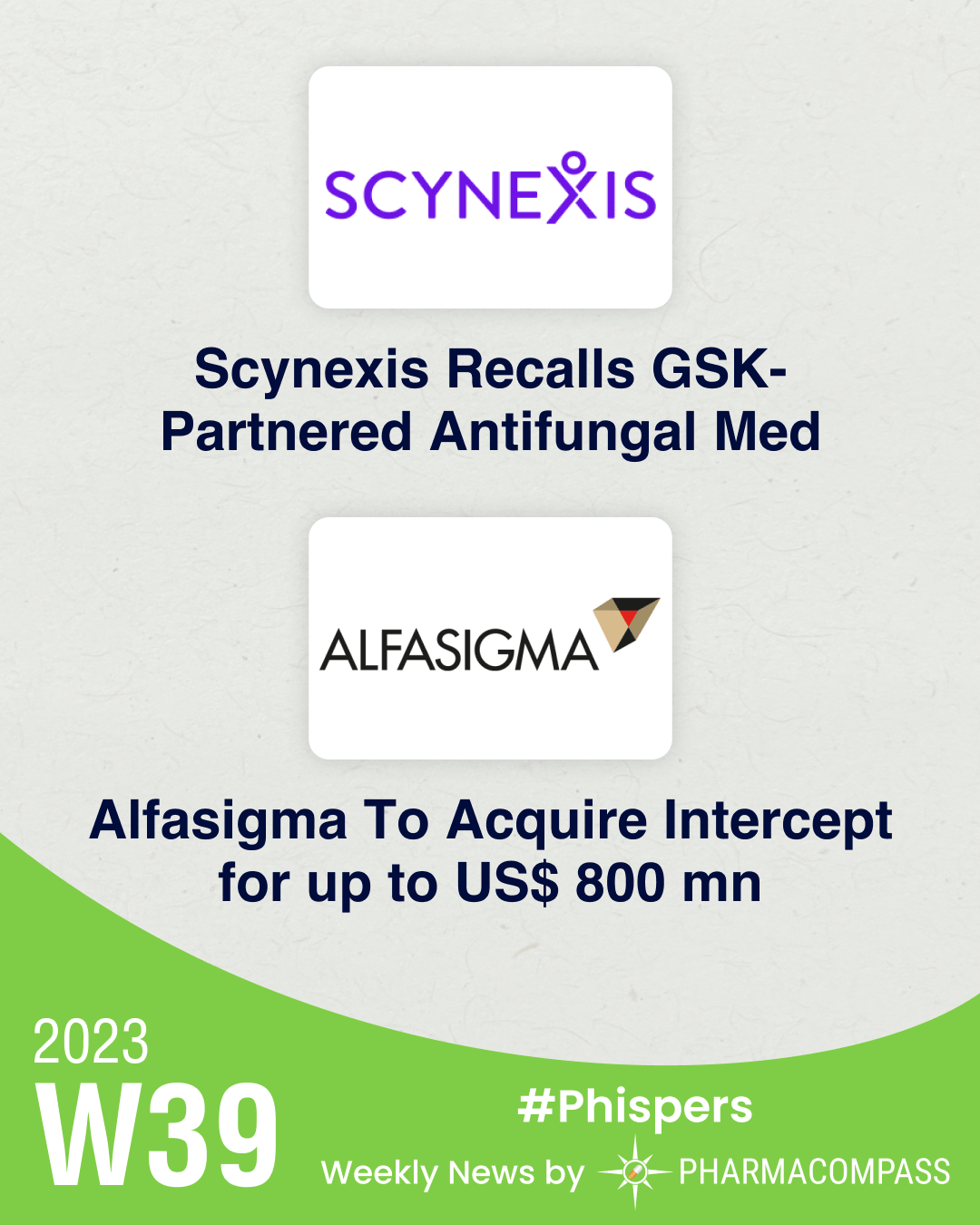
By PharmaCompass
2023-09-28
Impressions: 983 (Article) || 1 (Video)
In Phispers this week, Novartis has confirmed its plans for a 100 percent spin-off of its Sandoz business on October 4.
In trial news, AstraZeneca-Daiichi Sankyo’s experimental drug, Dato-DXd (datopotamab deruxtecan), effectively slowed the progress of a common type of breast cancer in a late-stage trial. And Ionis’ experimental drug, olezarsen, met the primary endpoint in a late-stage study for a rare genetic disorder.
In deals, Alfasigma has agreed to buy US liver disease drugmaker Intercept Pharmaceuticals for approximately US$ 800 million in cash. And AcuraStem and Takeda have joined hands to develop and market AcuraStem’s PIKFYVE targeted therapies, including a treatment for amyotrophic lateral sclerosis (ALS).
Scynexis has issued a voluntary recall of its anti-fungal medication, Brexafemme (ibrexafungerp), licensed to GSK, due to the risk of cross-contamination. Pakistan’s drug regulator is investigating two local distributors of Roche’s cancer drug, Avastin, after 12 diabetic patients who received the drug experienced vision loss.
Pfizer has resumed production at its tornado-hit North Carolina plant but has warned that drug shortages may last until mid-next year.
Astra-Daiichi’s experimental drug shows promise in treating breast cancer
AstraZeneca’s experimental drug, Dato-DXd (datopotamab deruxtecan), has shown promise in treating a common type (HR-positive, HER2-low or negative) of breast cancer, in a late-stage trial. The drug, developed in collaboration with Daiichi Sankyo, demonstrated significant and clinically meaningful improvement in slowing the progression of breast cancer when compared to patients who had received chemotherapy. These were patients with inoperable or metastatic HR-positive, HER2-low/negative breast cancer previously treated with endocrine-based therapy and at least one systemic therapy. Dato-DXd is currently being evaluated in more than 12 trials to assess its effectiveness in various other types of tumors, including non-small cell lung cancer and triple-negative breast cancer.
Ionis’ metabolic disorder drug scores win in late-stage study: Ionis Pharmaceuticals’ experimental drug, olezarsen, has successfully achieved the primary endpoint in a late-stage study evaluating olezarsen in individuals with familial chylomicronemia syndrome (FCS), a rare genetic disorder characterized by improper breakdown of fats in the body. The trial demonstrated a significant reduction in triglyceride levels. Furthermore, the drug also met the secondary endpoint of 100 percent reduction in acute pancreatitis events compared to a placebo.
Novartis to spin-off Sandoz into a separate business on Oct 4
Novartis has confirmed its plans for a 100 percent spin-off of its Sandoz business, with trading of new Sandoz Group AG shares and ADRs (American depositary receipts) to commence on October 4, 2023. This follows the shareholder approval obtained on September 15. Novartis has also obtained other key regulatory approvals including the approvals by SIX Exchange Regulation for listing Sandoz shares on the SIX Swiss Exchange.
Alfasigma to buy Intercept for about US$ 800 million; AcuraStem, Takeda ink deal
Alfasigma has agreed to buy US liver disease drugmaker Intercept Pharmaceuticals for about US$ 800 million in cash to expand its range of treatments for liver diseases and digestive system disorders and enhance its presence in the US. This acquisition will include the addition of Intercept’s Ocaliva, the only FDA approved second-line treatment for primary biliary cholangitis (a chronic disease in which the bile ducts in liver are slowly destroyed) to Alfasigma’s portfolio. This acquisition follows Intercept’s withdrawal from the race to develop the first treatment for non-alcoholic steatohepatitis (NASH) after its drug was rejected by FDA in June.
Meanwhile, AcuraStem and Takeda have entered into a license agreement to develop and commercialize AcuraStem’s PIKFYVE targeted therapeutics including AS-202, a treatment for ALS (a rare and fatal neurodegenerative disease). According to the agreement, AcuraStem will receive upfront and milestone payments that amount to approximately US$ 580 million. In return, Takeda will gain an exclusive global license to AcuraStem’s PIKFYVE program.
Scynexis, GSK issue voluntary recall of anti-fungal med due to contamination risk
Scynexis has issued a voluntary recall of its anti-fungal medication licensed to GSK, Brexafemme (ibrexafungerp), due to the risk of potential cross-contamination with an allergenic substance. This decision was prompted by GSK, post a recent review of the manufacturing processes and equipment for ibrexafungerp. Scynexis has said the recall is precautionary.
Pakistan probes Roche’s distributors for Avastin: The Drug Regulatory Authority of Pakistan (DRAP) is investigating two local distributors of Roche’s cancer drug, Avastin, after 12 diabetic patients who received the drug experienced vision loss. The regulatory authority stated that in these cases, Avastin had been used for off-label purposes. In a statement, Roche has strongly condemned the criminal act of counterfeiting.
FDA issues Form 483 to Cipla’s US subsidiary: FDA has issued a Form 483 with five inspectional observations to Cipla’s US-owned subsidiary, InvaGen Pharmaceuticals’ facility in New York after a pre-approval inspection conducted from September 11 to 19.
Meanwhile, FDA has issued a Form 483 with one observation to Sequent Scientific’s plant situated at Visakhapatnam, Andhra Pradesh (India) after an inspection held during September 18- 22. The company has said the observation is procedural in nature.
FDA advisors vote against BrainStorm’s therapy for ALS: FDA advisors have voted against BrainStorm Cell Therapeutics’ therapy for ALS. Only one member of the FDA panel voted in favor of the treatment — known as NurOwn — while 17 panel members said the data does not demonstrate substantial evidence of its effectiveness. One member abstained from voting. The therapy had failed to meet the primary goal in a late-stage study in 2020.
Tornado-hit Pfizer plant resumes production; Bosulif approved for kids
Pfizer has largely resumed production at its tornado-hit North Carolina plant. However, it has warned of potential supply shortages for some drugs from the facility, which may not be fully restored until at least the middle of next year. The production of around 13 medications, including those currently accessible through the company’s emergency ordering process, has been resumed. Pfizer’s Rocky Mount facility, one of the world’s largest sterile injectable drug manufacturing facilities, suffered damage due to a tornado on July 19.
Meanwhile, FDA has approved Pfizer’s Bosulif (bosutinib) for children one year of age and older with a rare type of bone marrow cancer known as chronic phase (CP) Ph+ chronic myelogenous leukemia (CML) that is newly diagnosed or resistant or intolerant to prior therapy. Most patients with CML have an abnormal chromosome in their blood cells. The drug is already being prescribed to adults with the same disease with resistance or intolerance to prior therapy.
The PharmaCompass Newsletter – Sign Up, Stay Ahead
Feedback, help us to improve. Click here
Image Credit : Phisper Infographic by PharmaCompass license under CC BY 2.0
“ The article is based on the information available in public and which the author believes to be true. The author is not disseminating any information, which the author believes or knows, is confidential or in conflict with the privacy of any person. The views expressed or information supplied through this article is mere opinion and observation of the author. The author does not intend to defame, insult or, cause loss or damage to anyone, in any manner, through this article.”








